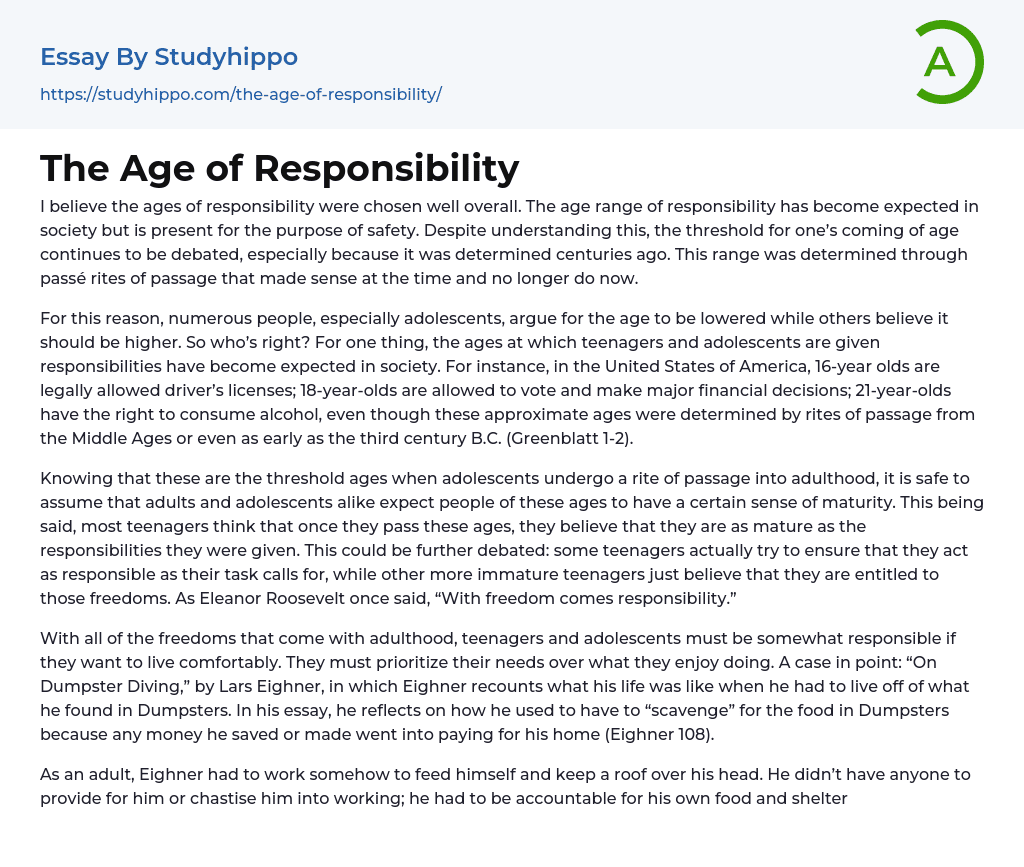In summary, I think the chosen ages of responsibility are appropriate for safety reasons. However, there is ongoing debate about the age at which one becomes an adult, particularly because it was established many years ago. These age markers were determined through outdated rites of passage that are no longer relevant. Consequently, many individuals, especially teenagers, advocate for a lower age limit while others believe it should be raised.
The determination of appropriate ages for assigning responsibilities to teenagers and adolescents is a topic that generates debate. In society, specific privileges have well-established age limits. For instance, in the United States, 16-year-olds can legally acquire driver's licenses, 18-year-olds can vote and make important financial decisions, and 21-year-olds have the right to consume alcohol. These age limits originate from ancient times dating back to medieval periods or even ear
...lier in the 3rd century B.C., signifying a transition into adulthood. Both adults and adolescents expect a certain level of maturity during these stages. However, ongoing discussions persist regarding whether teenagers genuinely attain the necessary level of maturity for their responsibilities. While some teenagers strive for responsible behavior, others believe they deserve the freedoms granted to them.
According to Eleanor Roosevelt, responsibility accompanies freedom. When teenagers and adolescents become adults, they must exercise some responsibility in order to live comfortably. This includes prioritizing their needs over their desires. Lars Eighner's essay, "On Dumpster Diving," illustrates this point as he recounts his experiences of living off of what he found in Dumpsters. In his reflection, Eighner discusses how he had to scavenge for food in Dumpsters because all the money he saved or earned was used to pay for his home
(Eighner 108). As an adult, Eighner had to find a way to work and provide for himself in order to have food and a place to live. He didn't have someone to support or admonish him into working; he had to take responsibility for his own sustenance and housing.
Adults must learn to take care of their own responsibilities and tasks because any postponed responsibilities still require attention. Similarly, teenagers need experience and practice in handling adult responsibilities before they reach the age of maturity. The distribution of responsibilities is staggered to allow teenagers to practice and prepare themselves before taking on more tasks. This approach ensures that adolescents are ready for the additional workload. Many individuals take on new responsibilities without feeling fully prepared and later regret it. For instance, Shannon, a woman from Oklahoma, believed she was too young and inexperienced to begin driving at 16 years old (qtd. In “When Does Responsibility Begin?”).
It is more practical to set a general age of responsibility based on when most adolescents feel mature rather than administering individual maturity tests. Having a majority rule is easier to manage than conducting thousands of individual tests. Therefore, I believe there is no need to alter the ages of responsibility because society has already established expectations within a certain age range, and adolescents will strive to meet those expectations. Adults have limited freedoms in order to prioritize their needs over recreational activities. The staggered ages for responsibility allow for practice and experience, helping adolescents reduce the risks they pose to themselves and others. Consequently, responsibility is learned. I consider the chosen ages of responsibility appropriate, as they align with the
majority's anticipated level of maturity, despite varying rates of maturation.
- American Literature essays
- Between The World and Me essays
- Book Report essays
- Book Review essays
- Book Summary essays
- Books essays
- Character essays
- Coming of Age essays
- Dante's Inferno essays
- Everyday Use essays
- Flowers for Algernon essays
- Genre essays
- Greek Mythology essays
- Incidents in The Life of a Slave Girl essays
- Letter essays
- Literary Criticism essays
- Literary devices essays
- Literature Review essays
- Metaphor essays
- Myth essays
- Play essays
- Plot essays
- Poem essays
- Poetry Analysis essays
- Protagonist essays
- Reader essays
- Reason essays
- Rhetoric essays
- Rhetorical Question essays
- Rhyme essays
- Simile essays
- Tragic Hero essays
- Translation essays
- Understanding essays
- Utopia essays
- Villain essays
- Writer essays




